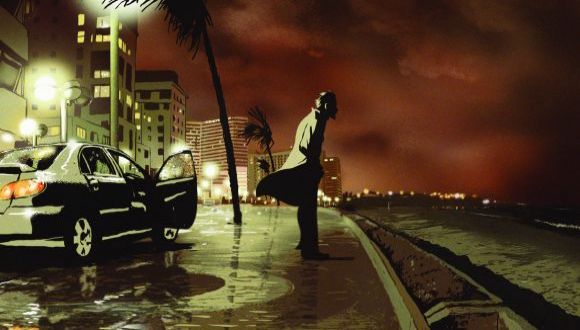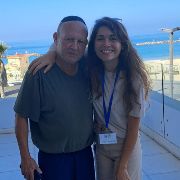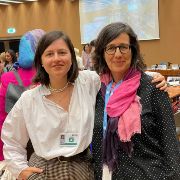Israel at the Movies
Film critic Prof. Shmulik Duvdevani speaks on how Israeli cinema gets to the heart of Jewish history, identity and trauma
To start, can you describe your background and your role at TAU?
I teach Israeli cinema and documentary cinema at the TAU Steve Tisch School of Film and Television. I did all three of my degrees here at the University and have been teaching here for 30 years. It’s really been my second home, and I love the fresh perspectives my students bring in all of our discussions. Some have gone on to become film critics like me, and some are now filmmakers including an Ophir Award winner (Erez Tadmor) and an Oscar winner (Guy Nativ)!
In my time at TAU I've published two books: First Person Camera about personal documentaries between the two intifadas; and very recently The First Modernists about Israeli documentaries of the 1960s-70s. Additionally, I’ve written film reviews for the newspaper YNet for the past 24 years, which I believe makes my column the longest-running film column in Israel.
Can you talk a bit about the Israeli film industry?
One thing I am very excited about is how many newcomers there are in the industry since the early 2000s. In the last 20 years Israeli cinema has given stronger voices to the many different communities that make up our society. Just in recent years we had Late Marriage that was in Georgian, we had Yana's Friends in Russian, we had Baba Joon in Persian, and we had Sandstorm in Arabic. There are ultra-Orthodox filmmakers including women like Rama Burshtein and even Palestinian directors such as Taufik Abu Wael (a TAU alum himself).
"Since the beginning, our cinema has dealt with what defines Israeli identity, or with the difficulty of defining it."
Since the beginning, our cinema has dealt with what defines Israeli identity, or with the difficulty of defining it. We have so many populations and viewpoints which are foreign or even diametrically opposed to each other, especially in the last year. We cannot even agree on our physical borders. I think Israeli cinema gives form and shape to these myriad stories by exploring the often-conflicting histories and traumas of different Israeli groups.
Dir. Avi Nesher's "Image of Victory" highlights the opposing narratives inherent to the story of Israel's beginning. (Screenshot: Amit Yasur)
What are some specifics of Israeli trauma in film?
One of the biggest themes we grapple with is the line between victim and perpetrator. Jews have been victims for so many years that conceiving of ourselves as aggressors creates cognitive dissonance. One common way we see this is through the Israeli soldier on screen. For example, right around the second Intifada (2000-2005) was the first time Israeli soldiers were being accused of war crimes in real time. In those few years three Lebanon War films were made in which Israeli soldiers are invading another country—but their perspectives remain those of traumatized victims. They can only see part of the reality. These films had widespread impact both in Israel and abroad; two were nominated for Oscars.
We also see how each time we experience a collective trauma, it is reflected implicitly in much of our cinema. After the Rabin assassination, there wasn’t a narrative piece about the event for 20 years. But for all of those 20 years, films repeatedly featured themes of missing or dead fathers and the effect of that absence on families. We saw symbolically how Rabin was a father figure for the country and how profoundly we all felt his loss.
"Waltz With Bashir" is one of three films that deal with trauma and guilt from the Lebanon War. (Art: Bridgit Folman Film Gang)
What are some films that you feel exemplify the Israeli trauma experience?
Take a film like Waltz With Bashir. This is a film that could only be made in Israel. It's a filmmaker looking back at the trauma of his military service and using his artistic tools to both explore it and go through a therapeutic process while dealing with perspectives that the Israeli film industry is uniquely concerned by: memory, guilt, accountability, national narratives and private narratives.
Another is Legend of Destruction about the destruction of the Second Temple and the exile of the Jewish People from the Land of Israel. Put into the context of the political turmoil we were experiencing up until October 7th, I think we can see how we are in certain ways right back where we were 2000 years ago. October 7th was something like the destruction of the temple in that it was a disaster that tapped into our most basic collective trauma.
Finally, Image of Victory about the War of Independence depicts how the Israeli and Palestinian narratives cannot really be separated. Its message is that you can’t tell one without the other, even though we have tried many times.
The Second Temple burns in Dir. Gidi Dar's "Legend of Destruction". (Art: David Polonsky and Michael Faust)
Do you expect the current war to be portrayed differently on film from previous wars? Do you think it will affect the way the Israeli experience is shown on film going forward?
Of course I am not a prophet, but yes, I think Israeli cinema is going to change, drastically. This trauma was like nothing we have ever witnessed—we cannot go back to telling the same old stories and dealing with the same old conflicts. I think it will continue to resonate for a long time because it sparks our oldest existential fears as Jews and Israelis. In 50 years, my son is going to tell his grandchildren exactly where he was on October 7th.
And since this situation is ongoing, we’re experiencing a national trauma that is perhaps entirely unique to our state—we're all experiencing the losses from both the attack and the war, we’re all experiencing the helplessness of the hostage situation, and most of us have had to run to shelters in the last months. So Israeli filmmakers will have to completely rethink how they deal with the aesthetics, ethics, and narratives of trauma. I think, unlike with the Rabin assassination, they will have to deal with the event very, very explicitly and directly. I don’t think it will be many years before we start seeing narrative films about it.
Future films may deal with the current violence very explicitly. (Screenshot: "Image of Victory", Amit Yasur)
What are your thoughts on the documentaries being made about the Oct. 7 tragedies?
I’ve actually already started teaching one of them in my Current Israeli Documentary class, Nova. That one came out vey quickly, but I know for a fact that there are many, many more on the way.
"I believe that whether people want to see it or not, the imagery both in documentaries and narrative cinema is going to be extremely graphic going forward."
What is unique about Nova is the way it actually uses found footage that was shot by survivors and victims—and the terrorists themselves on GoPros attached to their bodies. So in some cases you are “in the body” of a terrorist! In other scenes you are running or huddled in hiding with other people. One striking phenomenon is that even while hiding, people are speaking quietly to their phones as if they understand that they must provide this type of live coverage of their own survival attempt; or as they run they take out their phones and film the carnage around them. As a viewer you start to ask yourself, why do we have the impulse to use technology this way?
So I think this type of technology is going to be a major part of the aesthetics of upcoming documentaries. We have so much footage especially from GoPros, I think this new experience of being “attached to a body” will be a main feature of these films. I also believe that whether people want to see it or not, the imagery both in documentaries and narrative cinema is going to be extremely graphic going forward.
For "Nova", Dir. Dan Pe'er collected chilling first-person and selfie videos recovered from victims, survivors and terrorists at the music festival.
Have you changed your film classes to focus more around the war?
After October 7th I changed around my whole curriculum to focus on more current Israeli society, and after some debate I decided to begin with this documentary of the events at the Nova music festival. It turned out to spark a very meaningful class discussion. But I did need to consider how my students would react to certain images in ways I haven’t before. There are scenes that wouldn’t have had a negative impact a year ago that are now received very differently.
Do you think the drive to create documentaries stems from a desire for the world to see what we went through or from a need to work through it ourselves?
The answer is, of course, both. I imagine that people will want to make films about their own experiences. However I also think it is essential that people abroad see these films. Seeing how deeply anti-Zionism and antisemitism have taken root around the world and most strongly at elite academic institutions was a trauma in itself. Every single Harvard student and faculty member who has repeated violent chants and allowed hatred to go unchallenged should have to watch every film that comes out about the atrocities. They need to be shown that there is something rotten in the way they think that caused them to react the way they did. They should have to face head-on exactly what it is they are supporting.
"Every single Harvard student and faculty member who has repeated violent chants and allowed hatred to go unchallenged should have to watch every film that comes out about the atrocities. They should have to face head-on exactly what they are supporting."
For us here in Israel, though, we are all traumatized by the attacks. There is no doubt in my mind that the documentaries now and whatever cinema comes out in two or three years will have a profound effect on Israeli viewers and on Jewish viewers the world over.





